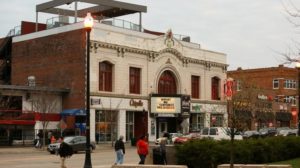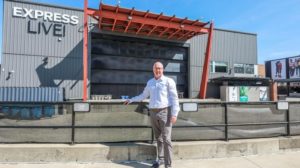The man who put on 10,000 shows: Scott Stienecker looks back on 40 years of rock ‘n’ rolling with PromoWest
April 22, 2019
By Emily Bench – Staff reporter, Columbus Business First
Apr 18, 2019
It all started with a house party.
“I ran around with a lot of guys who were a couple of years older than us, and always went to all their parties,” said Scott Stienecker, a veteran concert promoter whose shows have wowed music fans in Columbus for decades. “And they were like, ‘You need to throw a party.’”
So the then 17-year-old from St. Marys in western Ohio rented the Tri-County Event Center on Memorial Day weekend in 1978, hired a Kiss-esque band and charged $3 at the door.
Stienecker made $1,080 that night and officially entered the rock and roll promotions business.
Over the next few decades, he built PromoWest Productions and saw it become the fifth-largest independent music production company in the United States, hosting hundreds of memorable shows at venues including the Newport, The Basement and Express Live.
But the years can do a number on people in the music business, both those on stage and behind it. And so last September, Stienecker cut a deal with Los Angeles-based AEG Presents, which acquired a majority stake in PromoWest for an undisclosed amount.
“You can’t escape the competition,” said Stienecker, who now is regional manager of the Midwest market for AEG Presents. “Every day, I have to fight for Columbus – I fight against Cleveland, I fight against Cincinnati in order to get acts.”
After 35 years, the fighting got to be too much.
“The main thing for me was age – I was 58,” he said. “If they’re going to (buy) me out in five years, I’ll be 63 and that’s a good time to retire. So it was kind of a matter of time.”
Now, Stienecker is working for ‘the man,’ just like many other once-independent music companies.
“These big dogs just keep picking off the smaller markets,” he said. “One at a time.”
A recent concert at the Newport Music Hall concert
The Newport Music Hall was the first venue owned by PromoWest Productions.

Rock ‘n’ roll all night
When Stienecker was 15, he saw Kiss perform at St. John Arena on the Ohio State University campus.
“It blew me away,” he said. “I remember I sat there thinking: ‘Who put this whole thing on?’”
After high school, Stienecker went to Bowling Green State University, where he studied business and marketing and joined the school’s concert committee. At the time, he wanted to be the next Jules Belkin, the Cleveland resident whose Belkin Productions put on shows at Richfield Coliseum, Blossom Music Center and other venues in the region. (The company has since become part of Live Nation.)
“He was God,” Stienecker said of Belkin. “I wanted to become that … but I didn’t know if it would be possible.”
He transferred to Ohio State his sophomore year and ultimately landed an internship with Bill Graham Presents out in California, which he said was a turning point for him. He learned from one of the most influential men in the business who ran mega-successful music halls in San Francisco and New York City.
Stienecker decided to stay in California, and was hired on as a secondary concert promoter for Parallax Productions. It was there that he heard in 1984 that Hank LoConti, who owned Agora clubs in Cleveland and Columbus, was looking to sell the High Street music hall and turn it into a Walgreens.
Stienecker returned to Ohio and pleaded with him.
“I said, ‘Hank, you can’t let this happen,’” he said. “And he said he would lease it to me if I could come up with $25,000.”
Instead, the 22-year-old raised $180,000 and bought the building, turning it into the Newport Music Hall.
The first show he booked as PromoWest was Neil Young, who played a sold-out show at the Newport on Sept. 9, 1984.
Booking big
It didn’t take long for PromoWest to grow. Stienecker built his brand by creating popular clubs including Polaris Amphitheater, The Basement and the A&R Music Bar, while selling out shows at Ohio Stadium and buying the Bunbury Music Festival in 2015.
“It took a while and there were growing pains,” he said. “We started as a one-man show of a little independent, and grew into almost 60 full-time employees and 750 shows a year.”
Perhaps Stienecker’s biggest contribution was building the first-of-its-kind indoor/outdoor venue LC Pavilion in 2001. (It’s now Express Live.)
Stienecker said that site flipped the model of a music venue on its head. Soon, people across the country began to call, asking him to take his concept to other cities. He turned them all down until a developer in Pittsburgh called. The two created Stage AE, the second indoor/outdoor music venue in the nation.
“We figured it out,” he said. “It was like a light bulb went off.”
Express Live up close and backstage
Scott Stienecker’s Express Live indoor/outdoor stage changed the way concerts could be promoted and shown. Other venues immediately began to copy PromoWest’s formula after the site opened in 2001.

Randy Malloy, general manager of local alt-rock radio station 102.5, said Stienecker is an innovator.
“Scott is someone that has really really taken concert promoting to the next level,” Malloy said. “He takes the risks on bands that aren’t there yet, who haven’t made a big, and once they do, they come back.
“They remember Columbus because of him.”
Malloy said a good example is the band Jungle, which had trouble selling 60 tickets to a show in Chicago in 2014.The next stop on the band’s tour was Columbus.
Stienecker threw everything he had at promoting the show.
When the Jungle played the Newport, 800 people were there to see them.The band, which has toured the world, returned to Columbus in 2018 for another show at the Newport.
Ch-ch-ch-ch-changes
In many ways, the evolution of the music business has been hard for Stienecker to accept.
“What I loved … the most was the old days, when rock and roll was just rock and roll,” he said. “I miss when it was raw and real and there were local promoters in every market.
“Now, it’s very corporate.”
Live Nation was founded in 1996, grew quickly and started taking bites out of smaller markets. The publicly traded company had $10.8 billion in revenue last year.
AEG Presents was founded five years later and also began to move into smaller, independent markets.
“Once Live Nation came, the whole industry changed,” Stienecker said. “People are more focused on the bottom line than they are developing the acts.”
It takes time and a local interest to do that. Stienecker created spaces where small and local artists could play, moving up to bigger venues as they grew. That’s what worked for Twenty One Pilots and O.A.R., he said.
“They can move up from The Basement, to A&R, to the Newport and then to Express Live,” he said.
“We take the acts and develop them from the ground up.”
